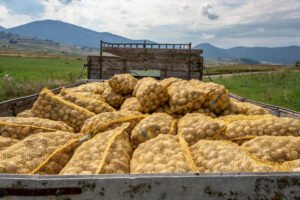Introduction

Environmental policies are essential for promoting sustainable agriculture, as they guide practices that protect natural resources, enhance biodiversity, and mitigate climate change. These policies provide frameworks for farmers to adopt eco-friendly practices that not only improve agricultural productivity but also contribute to environmental conservation. By implementing regulations and incentives, governments can encourage sustainable farming methods that ensure long-term food security while safeguarding ecosystems. This article examines the impact of environmental policies on sustainable agriculture, highlighting key initiatives such as the Common Agricultural Policy (CAP) in the EU and Canada’s Sustainable Agriculture Strategy.
The Role of Environmental Policies in Sustainable Agriculture

1. Promoting Eco-Friendly Practices
Environmental policies encourage farmers to adopt practices that minimize negative impacts on the environment.
- Common Agricultural Policy (CAP): The CAP includes measures that support organic farming and responsible management of inputs like pesticides and fertilizers. It promotes eco-schemes that reward farmers for implementing environmentally beneficial practices, such as reducing chemical use and enhancing soil health 1.
- Sustainable Agriculture Strategy (SAS): In Canada, the SAS aims to improve environmental performance in agriculture by providing direction for collective action on climate issues. It supports initiatives that enhance resilience to climate change while promoting sustainable farming practices 3.
2. Enhancing Biodiversity
Policies focused on biodiversity conservation are critical for maintaining healthy ecosystems within agricultural landscapes.
- Biodiversity Targets: The CAP aligns with EU biodiversity strategies by setting conditionality rules that cover habitat protection and landscape feature retention. These measures help safeguard pollinators and other beneficial species essential for crop production 12.
- Agroecological Practices: Policies that promote agroecology encourage farmers to implement practices such as crop rotation, intercropping, and maintaining hedgerows, which contribute to greater biodiversity on farms.
3. Supporting Climate Change Mitigation
Environmental policies play a vital role in addressing climate change through sustainable agricultural practices.
- Greenhouse Gas Reduction: The CAP allocates significant funding towards actions that reduce greenhouse gas emissions from agriculture, such as improved livestock management and investments in manure storage 1.
- Climate Resilience: Initiatives under the SAS focus on enhancing farmers’ ability to adapt to climate change through education and support for climate-smart agricultural practices 3.
4. Protecting Natural Resources
Effective environmental policies help safeguard essential natural resources critical for agricultural production.
- Water Management: Policies establish standards for water quality and quantity used in agriculture, promoting efficient irrigation systems and buffer strips along watercourses to protect water resources from pollution 1.
- Soil Conservation: Regulations encourage practices that maintain soil health, such as minimum soil cover requirements and restrictions on practices leading to soil erosion 12.
5. Economic Viability for Farmers
Sustainable agricultural policies not only benefit the environment but also enhance the economic viability of farming operations.
- Financial Incentives: Environmental policies often include financial support mechanisms that help offset the costs associated with transitioning to sustainable practices. This can include grants for adopting organic farming methods or funding for conservation projects.
- Market Access: By promoting sustainability, farmers can access new markets that prioritize eco-friendly products, thereby increasing their competitiveness and profitability.
Conclusion
Environmental policies are instrumental in promoting sustainable agriculture by encouraging eco-friendly practices, enhancing biodiversity, supporting climate change mitigation, protecting natural resources, and ensuring economic viability for farmers. Initiatives like the Common Agricultural Policy in Europe and Canada’s Sustainable Agriculture Strategy exemplify how government interventions can foster a more sustainable agricultural landscape. As global challenges related to food security and environmental degradation continue to grow, strengthening these policies will be crucial for achieving a resilient agricultural sector.
Advocate for robust environmental policies—support initiatives that promote sustainable agriculture in your community!
Q&A Section
Q: How do environmental policies promote eco-friendly farming?
A: Environmental policies provide incentives and regulations that encourage farmers to adopt sustainable practices, such as reducing chemical inputs and improving soil health.
Q: What is the Common Agricultural Policy (CAP)?
A: The CAP is a European Union policy framework aimed at supporting farmers while promoting environmentally friendly practices and enhancing food security across member states.
Q: Why is biodiversity important in agriculture?
A: Biodiversity contributes to ecosystem resilience, enhances pollination services, and supports overall agricultural productivity by maintaining healthy ecosystems.
Resources
- CAP and the Environment – European Commission
- Sustainable Agriculture Strategy – Canada.ca
- Sustainable Agricultural Practices – European Commission







